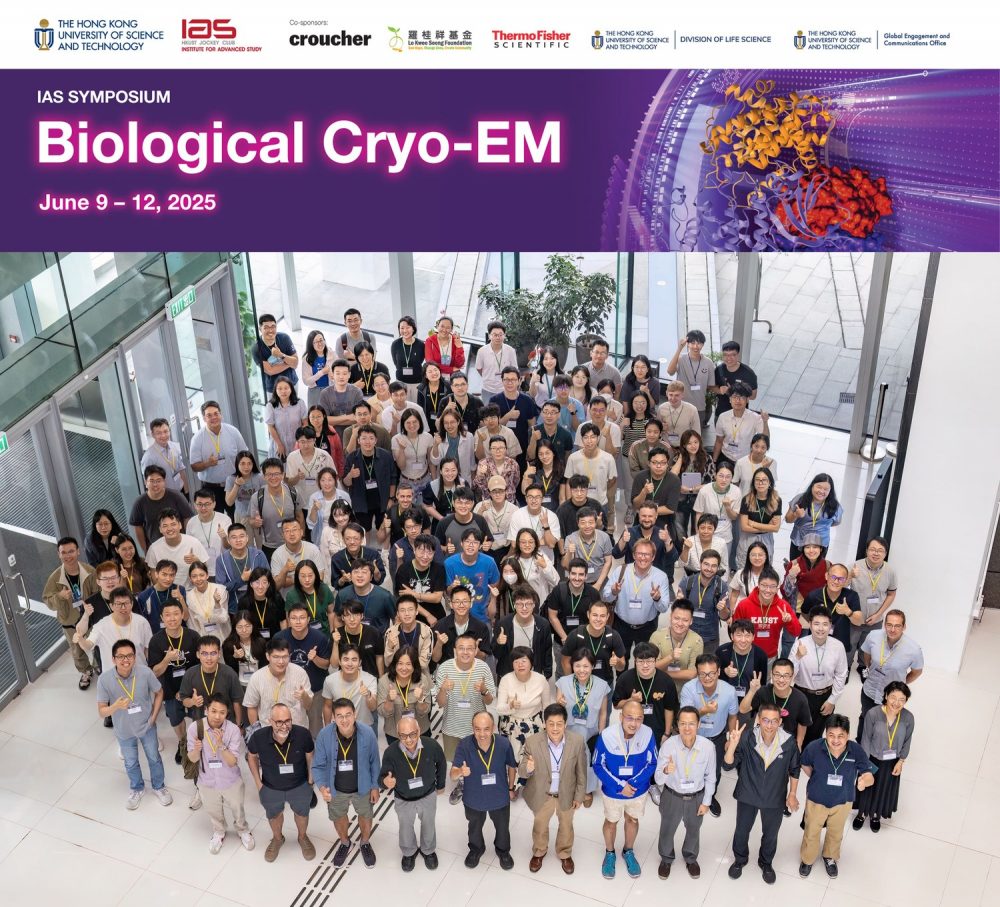
Cryo-electron microscopy (cryo-EM) has revolutionized structural biology by providing high-resolution insights into cellular machinery, enabling researchers to visualize macromolecules in their native states. This transformative technique continues to drive groundbreaking discoveries in the life sciences.
The 2nd IAS Symposium on Biological Cryo-EM at HKUST (June 9-12, 2025) united around 140 experts and attendees worldwide to explore cutting-edge research in single-particle analysis and cryo-ET. Distinguished speakers included Prof. Yifan CHENG (UCSF), Prof. Masahide KIKKAWA (University of Tokyo), Prof. Maofu LIAO (SUSTech), Prof. Yigong SHI (Tsinghua/Westlake University), Prof. Georgios SKINIOTIS (St. Jude Children’s Research Hospital), Prof. Hongwei WANG (Tsinghua University), Prof. Peijun ZHANG (University of Oxford) and Prof. Hong ZHOU (UCLA).
The organisers were Prof. Shanyu DANG (HKUST), Prof. Wilson Chun-yu LAU, (The Hong Kong Polytechnic University) and Prof. Tao NI, (The University of Hong Kong).
Esteemed researchers presented their findings through focused presentations, engaged in substantive discussions, and participated in dedicated networking sessions. The event fostered collaboration and knowledge exchange, aiming to accelerate progress in the scientific community.
The Division of Life Science supported awards for students who shared their research achievement in the symposium. The poster session began with a 2-min oral presentation, and six posters were selected for 15-minute short talks, earning either the Best Poster Award or the Best Short Talk Award.
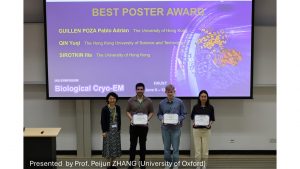
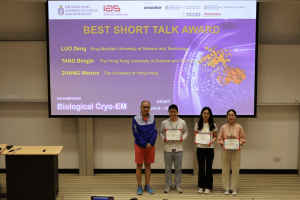
Co-sponsored by the Division of Life Science, HKUST, Croucher, Lo Kwee Seong Foundation, Thermo Fisher Scientific and Global and Communications Office, HKUST.
For more details, visit http://ias.ust.hk/events/202506bcem/home.php.
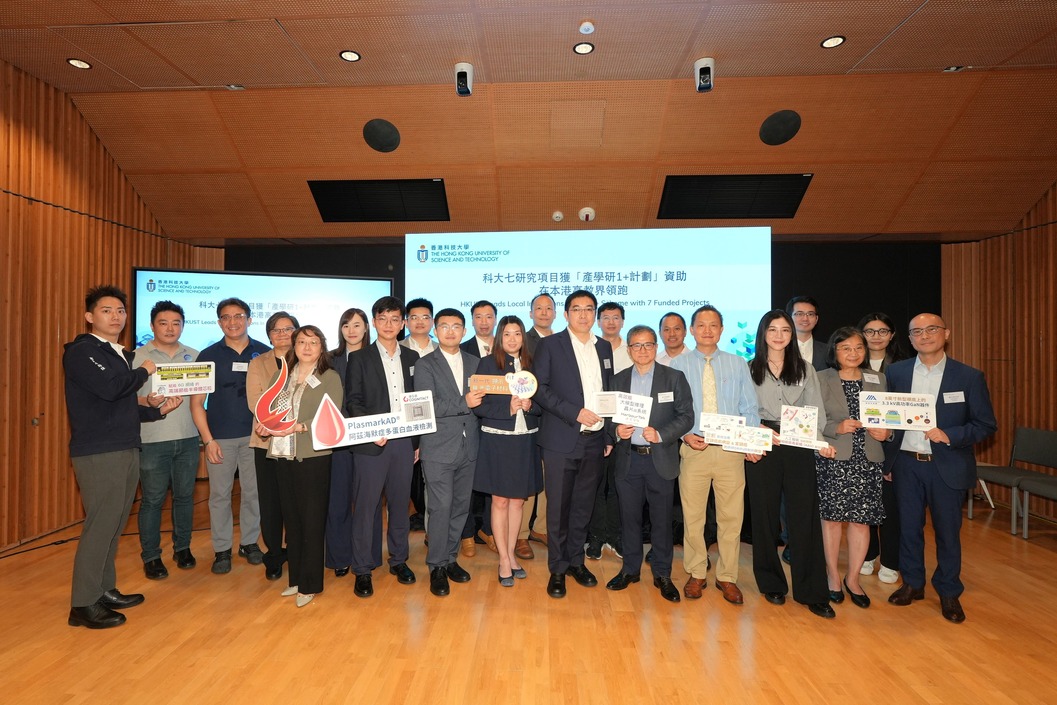
The Hong Kong University of Science and Technology (HKUST) secured grants for seven teams-the highest number among local institutions with two of the projects being awarded from the Division of Life Science.
Prof. LIANG Chun, Associate Professor from the Division of Life Science leads the project titled “Development of a Highly Efficacious First-in-Class Vaginal Gel Targeting DRIPs for Cervical Cancer and Precancerous Lesions”.
Project Details: Current treatments for cervical precancerous lesions rely heavily on invasive surgeries, which pose risks of premature birth, miscarriage, and high recurrence rates, particularly exacerbating healthcare disparities in developing countries. To address this issue, Prof. LIANG Chun and his team have developed a first-in-class vaginal gel that targets DNA replication-initiation proteins (DRIPs). This innovative therapy selectively induces apoptosis in abnormal cells while preserving healthy tissue, providing a safe, effective, and non-invasive alternative to surgery. Preclinical studies show 96% tumor growth inhibition and nearly 100% eradication of cervical cancer and precancerous cells. The team holds 17 patents for this technology and aims for its launch by 2031.
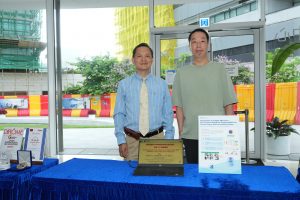
The “Development of a Highly Efficacious First-in-Class Vaginal Gel Targeting DRIPs for Cervical Cancer and Precancerous Lesions”. A group photo of Principal investigator Prof. LIANG Chun, Division of Life Science at HKUST (left) and his Postdoctoral Fellow Marco CHEUNG Man-Hei (right).
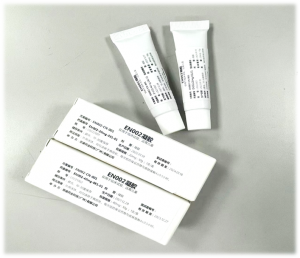
The team has developed a new generation of anticancer drugs that target DNA replication-initiation proteins (DRIPs), including a first-in-class topical gel for skin cancer and precancerous lesions, now in Phase II clinical trial, as shown in the photo. Building on this foundation, the team has developed a vaginal gel which is in preclinical study. This innovative therapy selectively induces apoptosis (programmed cell death) in abnormal cells while preserving healthy tissues, providing a safe, effective, and non-invasive medicine for cervical cancer and precancerous lesions.
Dr. JIANG Yuanbing, a Postdoctoral Fellow working in Prof. Nancy Ip’s lab, in the Division of Life Science, HKUST serves as the Principal Investigator for the Project: “Multi-centers clinical development of blood biomarker panels for detection of prodromal, mild cognitive impairment and early Alzheimer’s disease.” The Project Leader is Dr. OUYANG Li, Managing Director, Cognitact.
Project Details: Amid a global aging crisis, Alzheimer’s disease (AD) affects over 55 million people, with projections of 139 million by 2050. Building on pioneering research by Prof. Nancy Ip at HKUST, Dr. JIANG Yuanbing and the team have developed the world’s first multi-protein blood test for AD. This innovative tool was further developed into two pipelines at Cognitact: PlasmarkAD® Pro Series, offering 96% accuracy in identifying AD-related amyloid pathology and distinct AD-related biological processes; and the cost-effective PlasmarkAD® Lite for timely risk evaluation and screening, particularly in underserved communities. These advancements reduce testing costs by up to 80% compared to traditional PET scans. Supported by the RAISe+ Scheme, Cognitact is launching global trials to validate this transformative diagnostic solutions, and eventually benefit the ageing society at large.
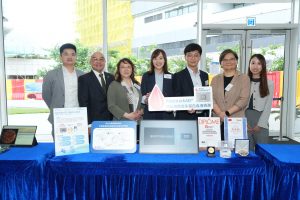
“Multi-centers clinical development of blood biomarker panels for detection of prodromal, mild cognitive impairment and early Alzheimer’s disease”. A group photo of Prof. Amy FU, Research Professor of the Division of Life Science at HKUST (second right); Dr. Fanny IP, Chief Scientific Officer of the Hong Kong Center for Neurodegenerative Diseases (third left); Principal Investigator Dr. JIANG Yuanbing, Postdoctoral Fellow of the Division of Life Science (third right); Project Leader Dr. OUYANG Li, Managing Director of Cognitact (middle); and other team members.
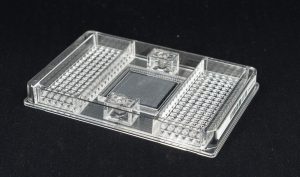
The team has developed world’s first comprehensive multi-protein AD blood test and identified 22 key biomarkers for AD. Combined with proprietary machine learning algorithms, the technology achieves a detection accuracy rate of up to 96%, achieving ultra-sensitive, highly specific and low false positive/negative rate in detecting the disease early. A photo of ultrasensitive blood protein biomarker analysis chip.
Initiated by the government in 2023, the RAISe+ Scheme aims to fund university research teams with strong potential to generate real social impact and market value. To qualify for funding, applicants must demonstrate excellence and distinction in the commercial viability of their project outcomes, as well as their relevance to government policies and community interests, among other areas. Last year, five HKUST teams received RAISe+ awards, and the funding has helped accelerate commercialization of their research discoveries, resulting in a win-win outcome among industry, academia, and research sectors.

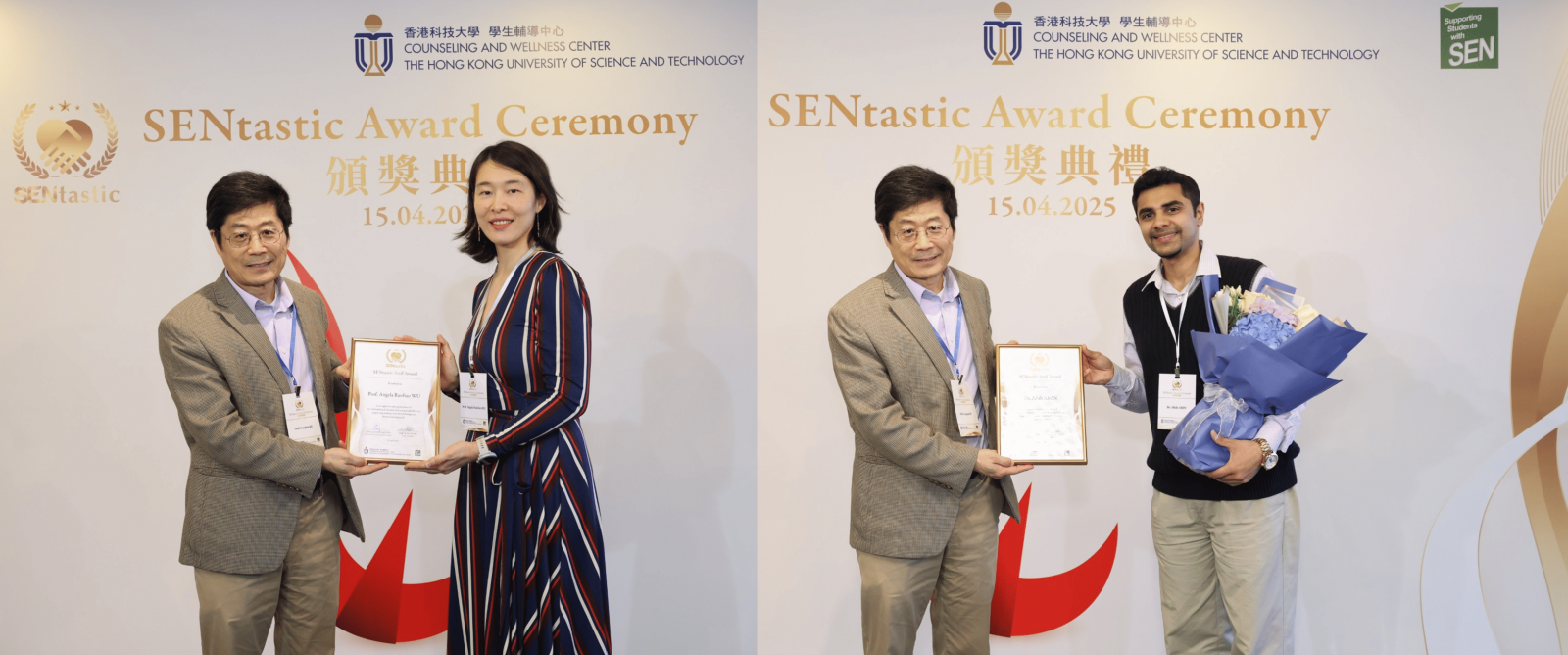
Prof. Angela WU, Associate Professor of Division of Life Science and of the Department of Chemical & Biological Engineering (left picture) and Dr. Aftab AMIN, lecturer of Division of Life Science (right picture) are recipients of the SENtastic Staff Award 2025.
This award honors the dedication of our faculty and staff for their exceptional efforts to enhance the well-being of our students, address diverse learning needs, and support special educational needs. It also serves as a platform for sharing best practices among educators and support staff, inspiring them to maintain their commitment to student care.
Congratulations to Prof. WU and Dr. AMIN and thank you for their contributions to create a more inclusive and supportive learning environment for all students!
For more information, please visit the following link:
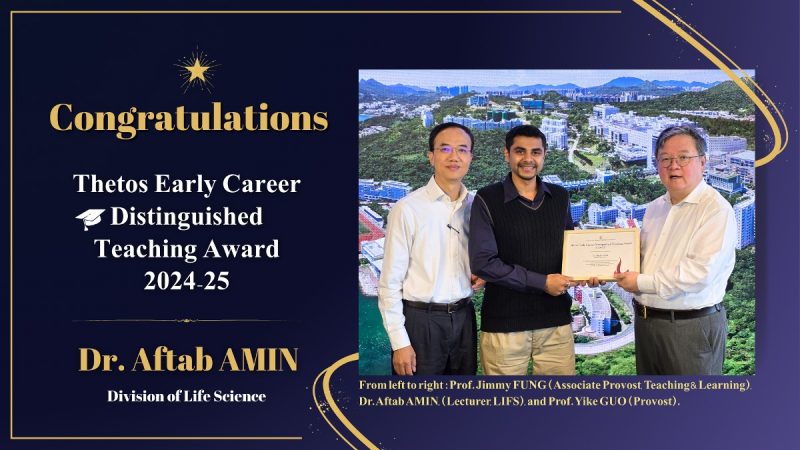
Dr. Aftab AMIN, a lecturer in the Division of Life Science (LIFS), who obtained his PhD in Life Science at HKUST, has been awarded the prestigious Thetos Early Career Distinguished Teaching Award, 2024-25.
The Thetos Distinguished Teaching Award, established by the Thetos Foundation, is the first award at the University dedicated exclusively to recognizing the contributions of teaching-track faculty. It honors their excellence in teaching and supports their initiatives for teaching advancement and personal development.
The Selection Committee, convened by Prof. Jimmy FUNG, the Associate Provost for Teaching & Learning, undertook the challenging task of reviewing the portfolios of a distinguished group of candidates before making final recommendations to Prof. Yike GUO, the Provost.
These awards acknowledge the exceptional dedication, innovative teaching methods, and significant contributions of faculty members to the educational mission of the University.
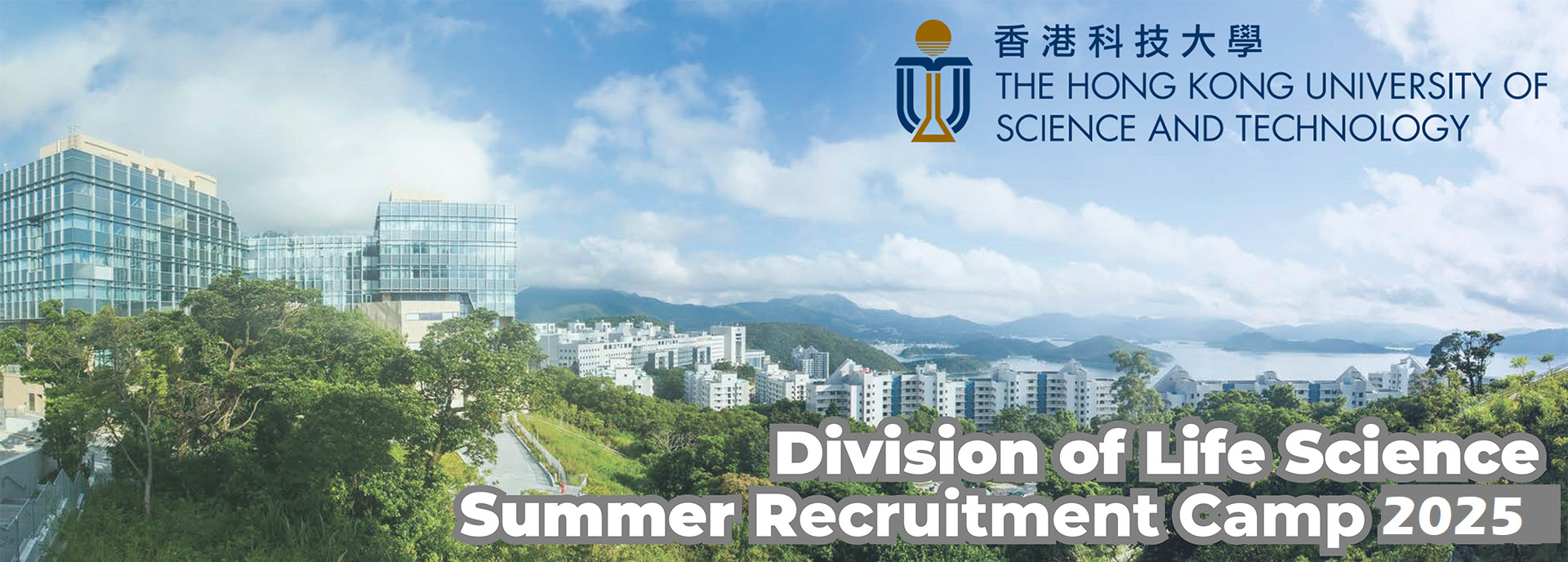
The Hong Kong University of Science and Technology (HKUST) promotes a vibrant and dynamic environment that emphasizes academic excellence, innovation and collaboration. Division of Life Science (LIFS) is host to cutting-edge, international quality research. There are six major areas of research interest including neuroscience, structural biology, cell & developmental biology, biotechnology, genomics and other interdisciplinary research.
This is a 5-day program for those who are interested in pursuing MPhil or PhD programs in Division of Life Science at HKUST in the Fall 2026/27.
Participants will attend a series of informal seminars introducing the current research topics and postgraduate programs offered in the Division of Life Science. These seminars are intended to foster discussion among the participants and faculty members and to serve as a basis for further social and scientific interactions. Participants will also have opportunities to visit the individual research labs and university research facilities, meeting with professors and fellow postgraduate students, and discuss research topics and others, such as preparing for graduate school.
The Program provides opportunity for the participants to learn the individual research groups and let the professors access your ability to conduct research projects in their MPhil or PhD programs.
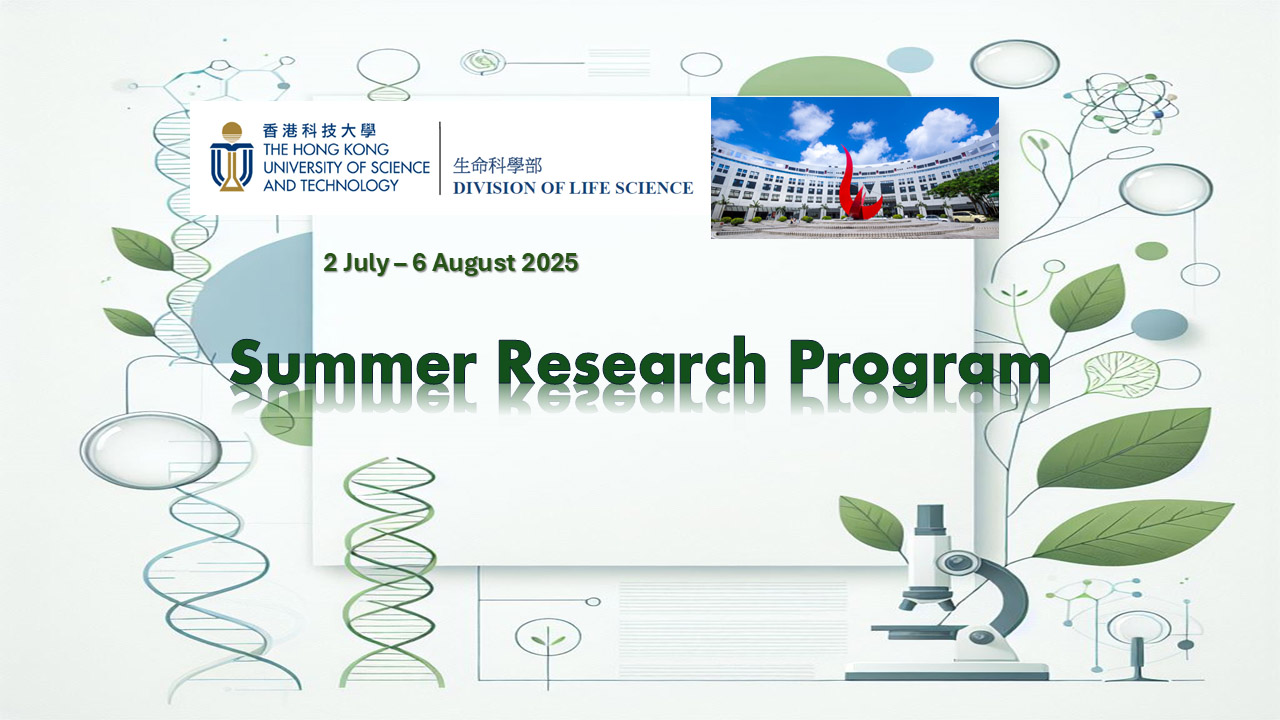
The Summer Research Program is designed for outstanding end-of-year 3 undergraduate students who are interested in pursuing research postgraduate study in the Division of Life Science at the Hong Kong University of Science and Technology (HKUST). This program offers participants the unique opportunity to immerse themselves in the research life at HKUST campus and work with faculty mentors from our Division in conducting research projects in an interactive environment. Participants can also choose to join the interview session of the LIFS Summer Recruitment Camp, which will be held on July 9-10.
2 July – 6 August 2025
Undergraduate students studying in Mainland China and overseas, majoring in Life Science, Chemistry, Biotechnology, Bioengineering, Computational Biology and related programs, who have completed 3 years of study (out of a 4-year bachelor program) and have attained a GPA of 3.2 out of 4.0 (or 80%) or higher.
Non-local students: A subsidy of around HK$10,000 will be provided to cover the on-campus student hostel fee and other local expenses. To enroll in this Summer Research Program, participants are required to pay the summer internship application fee, insurance, visa fee and a 1-credit tuition fee in advance (approximately HK$3,300). Additionally, participants are responsible for applying for a visa (which may take 10-12 weeks) and covering their own transportation costs to and from Hong Kong.
Local students: A subsidy of around HK$10,000 will be provided. To enroll in this Summer Research Program, participants are required to pay the summer internship application fee, insurance and a 1-credit tuition fee in advance (approximately HK$3,300). No housing will be provided. Participants are responsible for their own living expenses and transportation costs to and from Hong Kong, as well as from their living place to HKUST.
Submit online application via the link
Non-LOCAL students: https://ust.az1.qualtrics.com/jfe/form/SV_bCV2XrHe2KriZUi
LOCAL students: https://ust.az1.qualtrics.com/jfe/form/SV_5BHYspGw7pCX2dw
24 March 2025 (Monday)
The review of applications will be conducted by the Division of Life Science. Successful applicants will be notified by the Division as soon as the application is closed. After receiving the Division’s confirmation:
(For successful applicants only) Submit online Visiting Interns application to the Undergraduate Recruitment and Admissions Office (https://join.ust.hk/admissions/visiting/ ).

More than 50 alumni from the Division of Life Science (LIFS) returned to campus on 8 March 2025, to reconnect with fellow alumni and professors at the LIFS Alumni Homecoming 2025.
The event was inaugurated by Prof. Guojun BU, Head of Division, to kick off the lunch reception with a warm welcome and insightful updates on the latest developments within the Division. Representatives from the Life Science Alumni Association (LSAA) seized the opportunity to introduce the LSAA and shared their exciting upcoming agenda, followed by a heartfelt toast from the LIFS faculty members.
The homecoming lunch provided a wonderful opportunity for alumni and faculty to rekindle old friendships and foster new connections. By hosting regular meetups, the Division aims to strengthen the alumni community and cultivate a lasting sense of belonging.
Look forward to more LIFS get-togethers in the future! Stay informed about the Division of Life Science: https://life-sci.hkust.edu.hk/
See more photos of the event here.
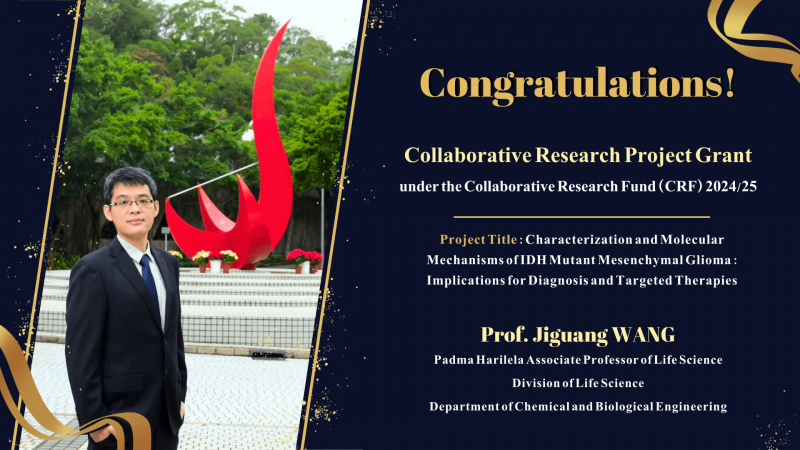
The Research Grants Council (RGC) has announced the results of the Collaborative Research Fund (CRF) 2024/25.
Congratulations to Prof. Jiguang WANG, Padma Harilela Associate Professor of Life Science (Division of Life Science (LIFS) and Department of Chemical and Biomedical Engineering (CBE)) for being a recipient of the Collaborative Research Project Grant (CRPG) under the Collaborative Research Fund (CRF) 2024/25.
Led by Prof. WANG, with HKUST co-investigators Prof. Shuhuai YAO (Mechanical and Aerospace Engineering (MAE) and CBE), Prof. Kai LIU (LIFS and CBE), and Prof. Can YANG (Department of Mathematics (MATH)), their project titled ” Characterization and Molecular Mechanisms of IDH Mutant Mesenchymal Glioma: Implications for Diagnosis and Targeted Therapies”, has received HKD 6 million from RGC. The project will run from 30 June 2025 to 29 June 2028, marking a significant step forward in glioma research.
The CRF supports multi-investigator, multi-disciplinary projects in order to encourage more research groups to engage in innovative and high-quality cross-disciplinary / cross-institutional collaborations.
Read More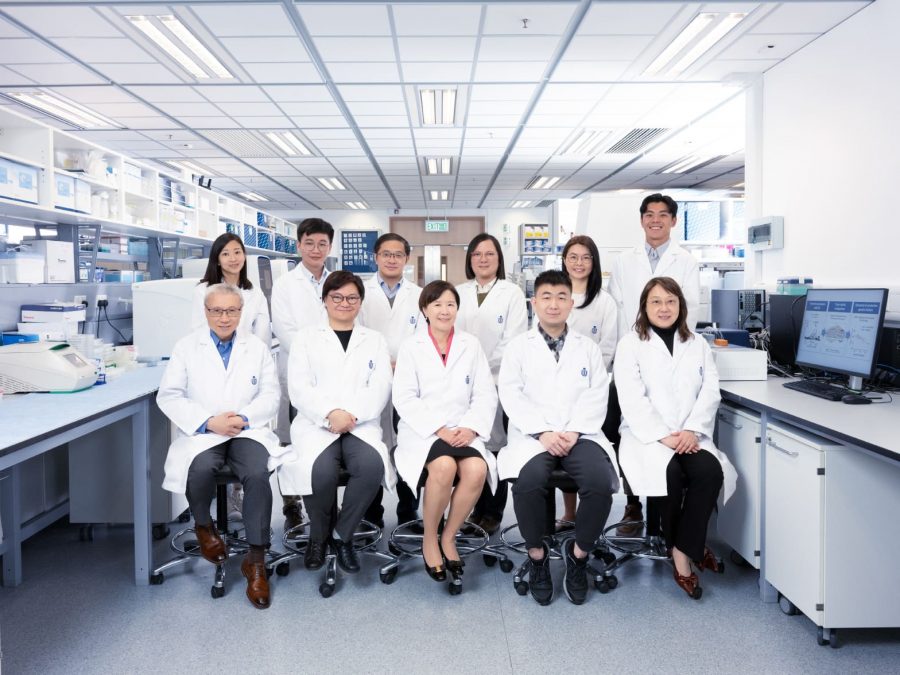
An international research team led by the Hong Kong University of Science and Technology (HKUST) has identified key genetic factors that confer protective effects against Alzheimer’s disease (AD) through a comprehensive genetic analysis of East Asian populations, including Chinese and Japanese, as well as European populations. This groundbreaking discovery sheds light on how these genetic factors can exert protective effects, unveiling the biological mechanisms underlying AD pathogenesis.
At a glance:
In the past decade, research into theSORL1gene (Sortilin-Related Receptor 1) has gained attention in the field of AD, as the protein it encodes, SORL1, plays a crucial role in regulating the production and clearance of amyloid-beta, a toxic protein that contributes to the pathology of AD. Studies conducted in individuals of European descent have suggested that certainSORL1genetic variants exert protective effects against AD, making it a potential target for disease intervention. However, most genetic studies have mainly focused on the European population, leaving gaps in understanding howSORL1variants affect other ethnic groups. Therefore, investigatingSORL1genetic variants in the East Asian population will provide new insights into how these variants may exert protection against AD. This highlights the importance of comprehensive research that includes diverse ethnic groups to enhance our understanding of how ancestral backgrounds influence the genetic mechanisms underlying the disease.
To investigate howSORL1genetic variants protect against AD in diverse populations, a multidisciplinary team led by Prof. Nancy IP, President and the Morningside Professor of Life Science at HKUST and Director of the Hong Kong Center for Neurodegenerative Diseases (HKCeND), performed a comprehensive genetic association analysis across East Asian populations, including individuals from mainland China, Hong Kong, and Japan, as well as European populations. This research was conducted in collaboration with Prof. John Hardy from University College London, Prof. Akinori Miyashita from Niigata University, and Prof. Yu Chen from the Shenzhen Institutes of Advanced Technology, Chinese Academy of Sciences, while also integrating data from international databases, including the Alzheimer’s Disease Neuroimaging Initiative.
The team identified keySORL1genetic variants in both East Asian and European populations. In particular, the Hap_A variant showed a strong protective effect against AD in the East Asian population, while it is relatively rare in the European population. The prevalence of Hap_A in East Asians is 168 times that of Europeans. Their analysis revealed that individuals carrying the Hap_A variant had better cognitive function, decreased neurodegeneration, and less severe AD pathology when compared with those not carrying the variant. Their findings demonstrated that different ethnic groups exhibit distinct sets of variants that exert AD-protective roles.
To further understand the biological mechanisms of these AD-protectiveSORL1genetic variants, the team comprehensively examined the functional roles of the variants. Their results showed that the AD-protective genetic variants are associated with increased SORL1 protein expression and may modulate biological pathways related to both immune and neuronal functions. Notably, the team identified a specific coding variant that regulates the expression and function of a SORL1 protein isoform, which had not been comprehensively studied previously. This finding provides new insights into the molecular mechanism underlying how SORL1 protein modulates AD risk.
“This study enhances our understanding of the role of SORL1 in AD and has uncovered its potential for therapeutic development,” said Prof. Ip. “Our research, built on international collaboration, contributes to one of the most comprehensive East Asian human databases for AD, serving as a valuable resource for studies of AD genetic factors in diverse ethnic populations.”
The research was supported by the National Natural Science Foundation of China (NSFC) and the Research Grants Council (RGC) of Hong Kong Joint Research Scheme and the InnoHK scheme of the HKSAR government. It was conducted in collaboration with researchers from University College London and Niigata University, as well as clinicians from the Prince of Wales Hospital and Queen Elizabeth Hospital. The findings have been recently published inAlzheimer’s & Dementia: The Journal of the Alzheimer’s Association, and featured onAlzforum, a scholarly exchange platform focused on AD research.
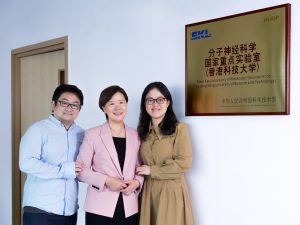
HKUST President Prof. Nancy IP (center) is joined by co-first author of this research paper and former Research Assistant Professor at HKUST Division of Life Science, Prof. ZHOU Xiaopu (left), and former Research Associate at HKCeND, ZHONG Huan (right).
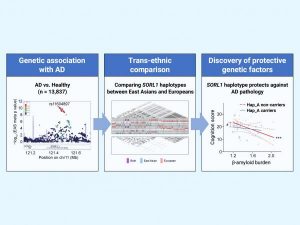
The team has identified numerous SORL1 genetic variants that protect against the risk of Alzheimer’s disease (AD) in the East Asian and European populations. By comparing the genetic structure across different populations, the team has further dissected the most critical AD-protective SORL1 variants in both groups. The specific genetic variant Hap_A of SORL1 is associated with an alleviated cognitive decline in patients with AD, indicating its important protective mechanism.
Reposted from https://hkust.edu.hk/news.
Read More